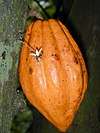Ghana Cocoa Board
_logo.jpg)
The Ghana Cocoa Board (Cocobod) is a Ghanaian government-controlled institution that fixes the buying price for cocoa in Ghana, the world's second largest producer of the commodity.[4] The price-fixing is intended to protect farmers from the volatile prices on the world market. While an overwhelming majority of cocoa is covered by the Cocobod, some special types of cocoa are not included, such as some fair trade, organic and high-quality beans. Besides the price-fixing, the organisation sells higher quality hybrid seeds, and does some research on cocoa plant-related diseases.
Between 1947 and 1979, the institution was known as the Cocoa Marketing Board.
History
Background
In 1937, farmers in Gold Coast, a colony of the British Empire equal to contemporary Ghana, refused to continue selling cocoa at the low prices set by European merchants and decided to withhold cocoa from the market. The strike went on for 8 months, until the British government acted by setting up the Nowell Commission of Enquiry to investigate the issue.[5] The Nowell Commission report advised the government to assist cocoa farmers by establishing a Marketing Board.
West African Produce Control Board (1940-1946)
In 1940, the government established the West African Produce Control Board to purchase cocoa under guaranteed prices from all West African countries. It operated throughout World War II and was dissolved in 1946.
Cocoa Marketing Board (1947-1979)
The first attempt to regulate market value and production was in 1947 through the Ghana Marketing Board, which dissolved in 1979 and was reconciled into Ghana Cocoa Board also called Cocobod [6]. The Ghana Marketing Board was established by ordinance in 1947 with the sum of 27 million Ghanaian Cedi as its initial working capital. In 1979, this Board was dissolved and reconstituted as the Ghana Cocoa Board.
Ghana Cocoa Board (1979-)
In 1984 Cocobod underwent institutional reform aimed at subjecting the cocoa sector to market forces. Cocobod's role was reduced, and 40 percent of its staff, or at least 35,000 employees, were dismissed. Furthermore, the government shifted responsibility for crop transport to the private sector. Subsidies for production inputs (fertilizers, insecticides, fungicides, and equipment) were removed, and there was a measure of privatization of the processing sector through at least one joint venture. In addition, a new payment system known as the Akuafo Check System was introduced in 1982 at the point of purchase of dried beans.
Ghana's Government implemented a very strategic plan in 1984 putting the sale of agriculture particularly Cocoa in the hands of the Government. With the regulation of pricing and manufacturing controlled by the government over 30,000+ jobs were lost but Ghana still holds its spot as one of three highest yielding countries of Cocoa.[6]
Controversies
Mr. Opuni's tenure at COCOBOD was engrossed in several allegations of corruption and mismanagement of the cocoa sector, with his critics accusing him of running down the critical sector; which generates revenue for the country and employs millions of Ghanaians.
In April 2016, the General Agriculture Workers Union (GAWU), and the Industrial Commercial Workers Unions (ICU), launched a scathing attack on the leadership of COCOBOD, accusing its Chief Executive Officer, Dr. Stephen Opuni of presiding over corruption.
GAWU and ICU said corruption at COCOBOD, headed by Dr. Stephen Opuni was affecting the production of cocoa in the country.
But some staff of COCOBOD at the time jumped his defence, insisting that, Dr. Opuni has not caused any disaffection within the ranks of COCOBOD as ICU and GAWU were alleging.
The Staff of the company thus served notice of withdrawing from the two unions, citing a growing mistrust between workers of COCOBOD and the unions. Stephen Opuni was removed from office when President Nana Addo Akufo-Addo took office in 2017. His bank accounts were frozen following investigations into some contracts he signed during his tenure. The Economic and Organised Crimes Office (EOCO) has been investigating him since he left office.[7]
Subsidiaries
- Cocoa Research Institute of Ghana (CRIG)
- Seed Production Division (SPD)
- Cocoa Health and Extension Division (CHED)
- Quality Control Company (QCC)
- Cocoa Marketing Company (CMC)
See also
- Cocoa production in Ghana
- Agriculture in Ghana
- Canada Wheat Board, a similar monopoly board that existed in Canada
References
- ↑ "COCOBOD gets new CEO". ghana web. ghana web. Retrieved 30 June 2018.
- ↑ "Dr. Stephen Opuni appointed CEO of COCOBOD". Ghana web. Ghana Web. Retrieved 30 June 2018.
- ↑ "COCOBOD Gets New CEO". Daily Guide. Daily Guide. Retrieved 30 June 2018.
- ↑ Cocobod.gh
- ↑ "CocoaMarketing.com". Archived from the original on 2010-02-16. Retrieved 2010-01-22.
- 1 2 "The Ghana Cocoa Story". Ghana Cocoa Board. 2016. Retrieved April 20, 2018.
- ↑ graphic.com.gh. "Who is Dr Stephen Kwabena Opuni?". Graphic Online. Retrieved 2018-06-30.
